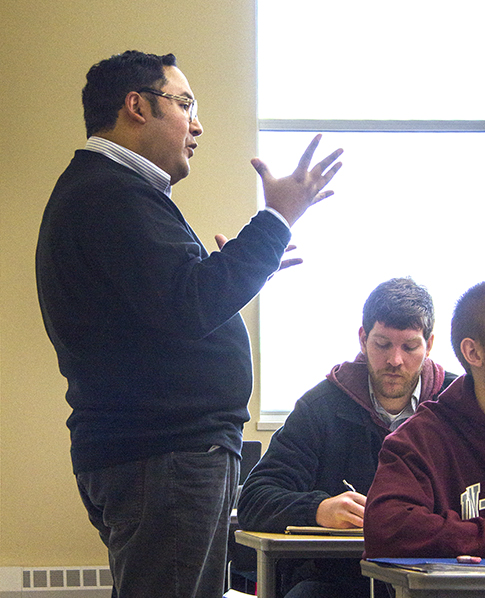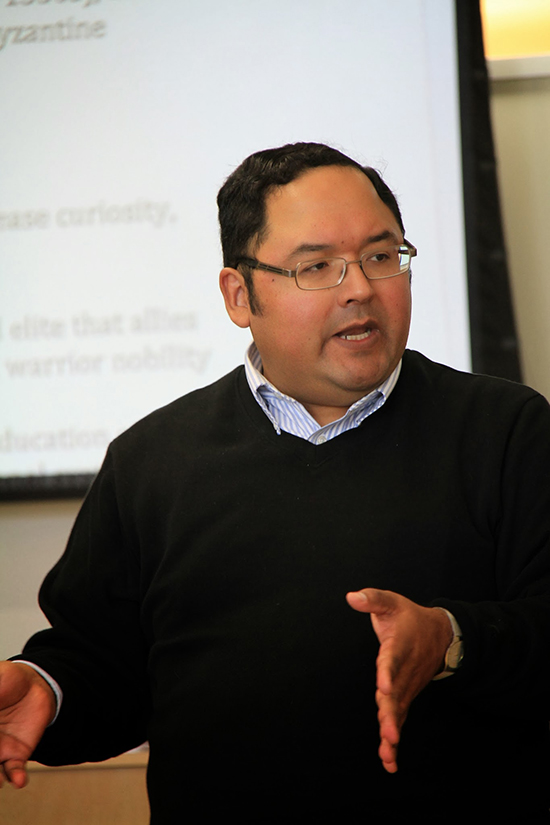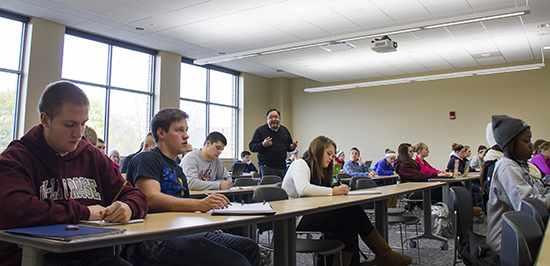Posted 2:04 p.m. Thursday, Nov. 14, 2013
Macías-González, UW-L history professor, received the Wisconsin Professor of the Year Award today in Washington D.C.
 UW-L History Professor Victor M. Macías-González[/caption]
Victor M. Macías-González came to the U.S. from Mexico in fourth grade with little to no English. He was soon on the 4th grade honor roll, in the sixth grade gifted and talented program, and the second-place winner of the eighth grade spelling bee.
Now the boy who came to this country academically behind his peers, is receiving a national award for propelling students forward. Macías-González, a history professor at UW-La Crosse, received the Wisconsin Professor of the Year Award on Thursday, Nov. 14, in Washington D.C. The award, sponsored by the Carnegie Foundation for the Advancement of Teaching, is part of the U.S. Professor of the Year Program, which salutes the most outstanding undergraduate instructors in the country.
It is not the first time UW-L has been recognized nationally for a stellar professor. History Professor Greg Wegner also won the award in 2011.
Macías-González attributes his academic success to the support he had early on from parents, teachers and mentors. It showed him the difference a teacher can make.
“My students’ success — and the curiosity they discover about history — motivates me very much,” he says. "My parents came poor to this country, but they brought a love of education and learning. Half of what we owned were books. I love books."
He knows students can sometimes struggle with the historic names, dates and geography he pulls up on the lecture slides. So, in a typical class, he’ll clown around or tell a funny story to snag attention. During a Tuesday afternoon class, he asks students to describe the transition from Medieval to Renaissance art. When they look puzzled, he demonstrates by pulling his body up tight to the classroom wall and making a silly, artistic pose. “The art before the Renaissance period was two dimensional,” he exclaims. His students chuckle.
“If you reach a person through humor, you can teach them anything,” says Macías-González. “But you have to get their interest first.”
[caption id="attachment_28484" align="alignleft" width="347"]
UW-L History Professor Victor M. Macías-González[/caption]
Victor M. Macías-González came to the U.S. from Mexico in fourth grade with little to no English. He was soon on the 4th grade honor roll, in the sixth grade gifted and talented program, and the second-place winner of the eighth grade spelling bee.
Now the boy who came to this country academically behind his peers, is receiving a national award for propelling students forward. Macías-González, a history professor at UW-La Crosse, received the Wisconsin Professor of the Year Award on Thursday, Nov. 14, in Washington D.C. The award, sponsored by the Carnegie Foundation for the Advancement of Teaching, is part of the U.S. Professor of the Year Program, which salutes the most outstanding undergraduate instructors in the country.
It is not the first time UW-L has been recognized nationally for a stellar professor. History Professor Greg Wegner also won the award in 2011.
Macías-González attributes his academic success to the support he had early on from parents, teachers and mentors. It showed him the difference a teacher can make.
“My students’ success — and the curiosity they discover about history — motivates me very much,” he says. "My parents came poor to this country, but they brought a love of education and learning. Half of what we owned were books. I love books."
He knows students can sometimes struggle with the historic names, dates and geography he pulls up on the lecture slides. So, in a typical class, he’ll clown around or tell a funny story to snag attention. During a Tuesday afternoon class, he asks students to describe the transition from Medieval to Renaissance art. When they look puzzled, he demonstrates by pulling his body up tight to the classroom wall and making a silly, artistic pose. “The art before the Renaissance period was two dimensional,” he exclaims. His students chuckle.
“If you reach a person through humor, you can teach them anything,” says Macías-González. “But you have to get their interest first.”
[caption id="attachment_28484" align="alignleft" width="347"] Victor M. Macías-González[/caption]
Macías-González has taken a specific interest in working with under-represented and first-generation students. The biggest challenge for these students, he says, is a lack of knowledge about how to take advantage of opportunities that already exist, such as resources to help them pursue graduate school. A 2006 UW-L study found that 30 to 40 percent fewer non-white students attended graduate school than white students. And a follow-up study by UW-L’s Office of Multicultural Student Services showed many shortcomings in what minority students knew about the process for applying to graduate school.
These facts led Macías-González and Barbara Stewart, UW-L associate dean for Campus Climate and Diversity, to design UW-L’s Eagle Mentoring Program in 2008, a retention initiative for under-represented, underprivileged second-year students. The program identifies promising students and provides them with mentors and opportunities to help them close the achievement gap.
UW-L Junior Maricruz Sanchez said the Eagle Mentoring Program offered her opportunities visit graduate school programs at other campuses, polish her resume and cover letter and ask questions.
“He (Macías-González) showed he cared and had confidence in us and made us want to try even more,” she says about students in EMP. “For me, it’s not because I don’t have the support of my parents, but I’m a first generation college student and my parents didn’t know the answers.”
Even after Sanchez completed EMP, Macías-González continued to guide her. He made her see that graduate school could be possible for her both financially and academically. He also made her aware of the McNair Scholars Program on campus, which provides students support and preparation for graduate school.
“He was always giving me advice… now I’m accepted into the McNair Scholars Program and I think it’s in great part due to him.”
Today more than 90 percent of EMP students graduate college. They generally see GPA improvements of .2 to .3 points after their first year in the program and about 70 percent go on to have “high impact experiences” such as study abroad and undergraduate research as well as internships that give them a better profile to pursue future academic and employment opportunities.
[caption id="attachment_28477" align="alignleft" width="550"]
Victor M. Macías-González[/caption]
Macías-González has taken a specific interest in working with under-represented and first-generation students. The biggest challenge for these students, he says, is a lack of knowledge about how to take advantage of opportunities that already exist, such as resources to help them pursue graduate school. A 2006 UW-L study found that 30 to 40 percent fewer non-white students attended graduate school than white students. And a follow-up study by UW-L’s Office of Multicultural Student Services showed many shortcomings in what minority students knew about the process for applying to graduate school.
These facts led Macías-González and Barbara Stewart, UW-L associate dean for Campus Climate and Diversity, to design UW-L’s Eagle Mentoring Program in 2008, a retention initiative for under-represented, underprivileged second-year students. The program identifies promising students and provides them with mentors and opportunities to help them close the achievement gap.
UW-L Junior Maricruz Sanchez said the Eagle Mentoring Program offered her opportunities visit graduate school programs at other campuses, polish her resume and cover letter and ask questions.
“He (Macías-González) showed he cared and had confidence in us and made us want to try even more,” she says about students in EMP. “For me, it’s not because I don’t have the support of my parents, but I’m a first generation college student and my parents didn’t know the answers.”
Even after Sanchez completed EMP, Macías-González continued to guide her. He made her see that graduate school could be possible for her both financially and academically. He also made her aware of the McNair Scholars Program on campus, which provides students support and preparation for graduate school.
“He was always giving me advice… now I’m accepted into the McNair Scholars Program and I think it’s in great part due to him.”
Today more than 90 percent of EMP students graduate college. They generally see GPA improvements of .2 to .3 points after their first year in the program and about 70 percent go on to have “high impact experiences” such as study abroad and undergraduate research as well as internships that give them a better profile to pursue future academic and employment opportunities.
[caption id="attachment_28477" align="alignleft" width="550"] Victor M. Macías-González teaches UW-La Crosse students.[/caption]
Macías-González has a history of teaching excellence and has helped shape History Department curriculum, including the development of five new courses in the past seven years and the development of online courses, notes UW-L Provost Heidi Macpherson.
“Dr. Macías-González further distinguishes himself by his intense commitment to providing underrepresented students access to academic opportunities, thereby closing the achievement gaps that are known to exist,” she writes in a nomination letter for the award.
Macías-González ultimately sees teachers as agents for positive change in society.
“When you want to keep people down, keep them ignorant,” he explains. “If you want them to succeed, educate them.”
It’s no surprise he uses history to further explain his point. Stalin and Hitler conquered and divided Poland, he explains, by rounding up the Polish army officers, artists, intellectuals, landowners and teachers to kill them — with the goal of destroying the educated people and ruling without objection. Macías-González wants the opposite — he aims to provide people with the reading, writing, and critical thinking skills to apply not only in classes, but throughout their life.
“Being able to encourage young people to pursue a life of study and learning; it does not pay much, but it’s very rewarding,” he says. “Where else are you paid to teach others what you love?”
Victor M. Macías-González teaches UW-La Crosse students.[/caption]
Macías-González has a history of teaching excellence and has helped shape History Department curriculum, including the development of five new courses in the past seven years and the development of online courses, notes UW-L Provost Heidi Macpherson.
“Dr. Macías-González further distinguishes himself by his intense commitment to providing underrepresented students access to academic opportunities, thereby closing the achievement gaps that are known to exist,” she writes in a nomination letter for the award.
Macías-González ultimately sees teachers as agents for positive change in society.
“When you want to keep people down, keep them ignorant,” he explains. “If you want them to succeed, educate them.”
It’s no surprise he uses history to further explain his point. Stalin and Hitler conquered and divided Poland, he explains, by rounding up the Polish army officers, artists, intellectuals, landowners and teachers to kill them — with the goal of destroying the educated people and ruling without objection. Macías-González wants the opposite — he aims to provide people with the reading, writing, and critical thinking skills to apply not only in classes, but throughout their life.
“Being able to encourage young people to pursue a life of study and learning; it does not pay much, but it’s very rewarding,” he says. “Where else are you paid to teach others what you love?”
